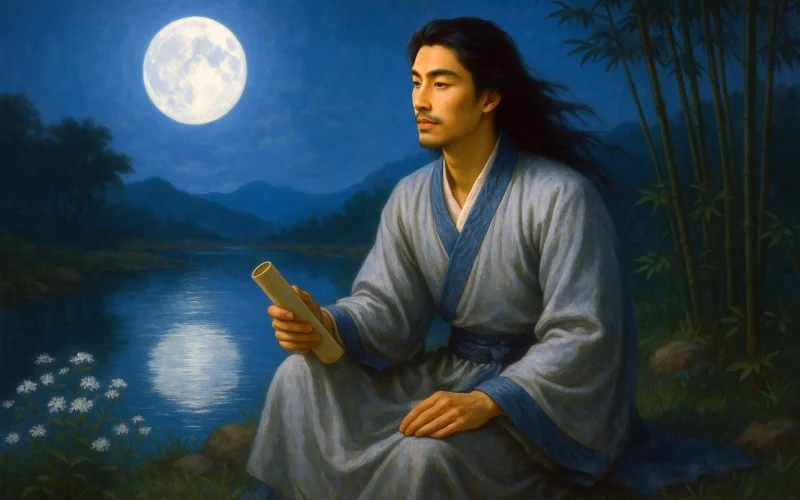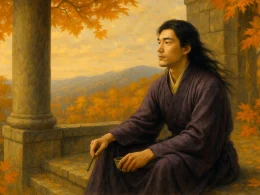Zeng Gong (曾巩, 1019 - 1083), a native of Nanfeng in Jiangxi, achieved the jinshi degree in the second year of the Jiayou era (1057) during the Northern Song Dynasty and rose to the position of Zhongshu Sheren (Secretariat Drafter). As one of the "Eight Great Prose Masters of the Tang and Song," his writing style was characterized by classical elegance and measured composure, renowned for its rigorous reasoning and refined prose. His poetry, though less celebrated than that of his contemporaries like Su Shi and Wang Anshi, was marked by simplicity and subtlety. Praised by Wang Anshi as "pure in its purity," Zeng Gong was later revered as the patriarch of the "Nanfeng School" of prose. Additionally, he excelled in textual criticism, editing ancient texts such as Strategies of the Warring States and Garden of Persuasions, securing a unique place in both Song Dynasty scholarship and the history of prose development.
Major Works
Life
Born in the third year of the Tianxi era (1019) and passing away in the sixth year of the Yuanfeng era (1083), Zeng Gong, courtesy name Zigu, was posthumously honored as "Master Nanfeng." His family, long established in Nanfeng County (modern Jiangxi), belonged to the literati class. His grandfather, Zeng Zhiyao, served as a high-ranking official known for his forthright remonstrations, while his father, Zeng Yizhan, was a erudite scholar. Nurtured in this scholarly environment, Zeng Gong displayed extraordinary literary talent from a young age. According to the History of Song, at twelve, he composed Six Discourses, which "presented grand theses in majestic prose," astonishing local scholars. At fourteen, he accompanied his father to Rugao County, where he studied at a Buddhist temple, immersing himself in Jiangnan culture and laying the groundwork for his future literary career.
In his youth, Zeng Gong's intellect and demeanor set him apart. At eighteen, he traveled to the capital and befriended the then-unknown Wang Anshi, forming a lifelong bond. At twenty, he presented his Current Affairs Policy to the literary giant Ouyang Xiu, who praised him as "profound and brilliant, already shaking the world." Despite his talent, Zeng Gong struggled in the imperial examinations, as his focus on classical prose clashed with the era's formulaic exam essays. In 1047, his father's sudden death forced him to abandon his studies and return home to support his family. Amid poverty, he cared for his stepmother and raised his siblings, often "toiling for sustenance by day and reading by candlelight at night."
His fortunes changed in 1057 when Ouyang Xiu, as chief examiner, reformed the exam style to favor classical prose. At thirty-nine, Zeng Gong finally earned his jinshi degree alongside his brothers, launching his official career. As a local magistrate, he gained renown for his judicious rulings. Later, recommended by Ouyang Xiu, he joined the imperial library, spending nine years collating ancient texts like Strategies of the Warring States and Garden of Persuasions, penning insightful prefaces that preserved China's literary heritage.
In 1069, appointed to compile the Veritable Records of Emperor Yingzong, Zeng Gong clashed with Wang Anshi's reform faction and was reassigned to local posts. Over the next decade, he governed seven prefectures, implementing benevolent policies. In Qizhou, he cracked down on local gangs; in Hongzhou, he established hospitals during a plague; in Fuzhou, he abolished exploitative policies harming farmers. His governance earned him such devotion that communities built shrines in his honor.
In 1081, the court recalled him to oversee the History of Five Dynasties. Appointed Zhongshu Sheren in 1082, he drafted imperial edicts but, feeling aged, repeatedly sought retirement. He died in Jiangning (modern Nanjing) in 1083 at sixty-five, posthumously honored as "Duke Wending of Nanfeng."
Literary Achievements
A central figure in the Northern Song prose revival, Zeng Gong excelled in essays that blended classical tradition with moral purpose. His extant Yuanfeng Drafts contain nearly 800 essays, spanning political treatises, historical critiques, and personal reflections.
His political writings, like On Disaster Relief, systematized famine response strategies, emphasizing preparedness and systemic action. Essential Policies of Our Dynasty analyzed mid-Northern Song governance, showcasing his depth of thought. Unique works like Account of Duke Zhao's Disaster Relief in Yuezhou blended administrative record-keeping with literary flair, pioneering a genre.
As a textual critic, his prefaces—such as those for Strategies of the Warring States and Biographies of Exemplary Women—combined scholarly rigor with literary merit. Zhu Xi later praised: "Zeng's prose flows with robust vitality and crystalline reasoning, calming the reader's mind."
His personal essays revealed restrained emotion. Letter to Academician Ouyang expressed profound gratitude to his mentor, while Ink Pond Chronicle used Wang Xizhi's calligraphy legacy to explore diligence's role in artistry. Though understated, these works resonated deeply through their sincerity.
Though less prolific in poetry, his 400 surviving poems displayed distinctive qualities. West Tower captured nature's grandeur: "Waves surge cloudlike, retreat and return; / North winds rouse thunderclaps in turn." The Willow satirized opportunism: "Twigs not yet gold, drunk on eastern breeze, / Flaunt wild arrogance with ease." His socially conscious Collecting Rent laid bare peasant suffering, while historical poems like Reading the Five Dynasties History reflected his historian's insight.
Stylistic Features
Zeng Gong's prose artistry manifested in structure, language, and emotional balance.
Structurally, he tailored forms to content. Record of Yihuang County School followed a tripartite progression—documenting construction, expounding education's value, and culminating in Confucian ideals—while Daoshan Pavilion Chronicle wove geography, architecture, and local customs into organic unity.
His language prized simplicity with depth. Rejecting ornate parallel prose, he revived Qin-Han clarity. On Disaster Relief employed rhetorical questions ("How many prefectures suffered?" "What food remained?") to strengthen arguments rhythmically. Chronicle of the Perilous Terrace, narrating Confucius's hardships, used plain language to ponder historical ironies, achieving "austerity that conceals richness." Strategic parallelism, as in Preface to Strategies of the Warring States—"Words must be actionable; actions must be expressible"—enhanced momentum without sacrificing fluency.
Emotionally, his Confucian restraint embodied the "joy without excess, grief without indulgence" ideal. Preface for Li and An balanced encouragement with mild critique, while Eulogy for My Late Wife mourned through domestic vignettes rather than lamentation. Even historical reflections, like Preface to the History of Liang, blended pathos with scholarly detachment.
Legacy
Zeng Gong's influence extended beyond literature into education, governance, and cultural memory.
As an educator, his Xinglu Academy emphasized moral cultivation through classical study, nurturing talents like his brother Zeng Bu (a future chancellor) and disciples such as Chen Shidao. His pedagogy stressed adaptability: "Scholars must choose their path prudently."
Politically, he advocated cautious reform. Though close to Wang Anshi, he warned, "Laws must change, but change demands caution." His localized policies—community policing in Qizhou, tax reforms in Fuzhou—balanced imperial directives with grassroots realities. His disaster management principles in On Disaster Relief remain relevant today.
Culturally, later dynasties enshrined his prose as canonical. Ming Dynasty Tang-Song School leader Gui Youguang lauded its "balanced vigor"; Qing Dynasty Tongcheng School founder Fang Bao admired its "elevated simplicity." In Nanfeng, his study cave and shrine endure, while Jinan's Nanfeng Temple commemorates his governance.
In 2000, France's Le Monde named him among twelve "Millennial Heroes"—the sole Chinese literary figure—affirming his global significance. His integrity, familial devotion, and mentorship epitomized the scholar-official ideal. As the History of Song noted: "Between Ouyang Xiu's expansiveness and Wang Anshi's intensity, Zeng Gong carved a distinctive path—unhurried yet profound." Through moral and literary excellence, he bequeathed treasures to China's cultural heritage.




































